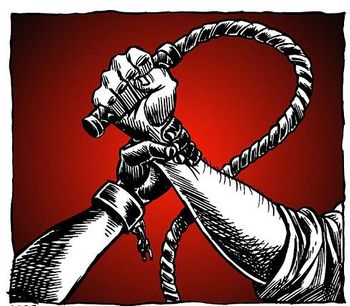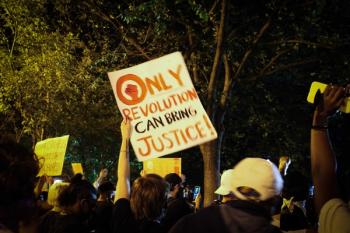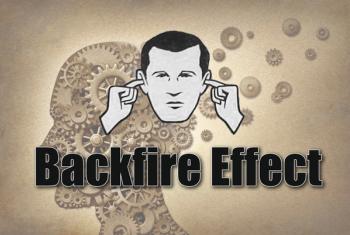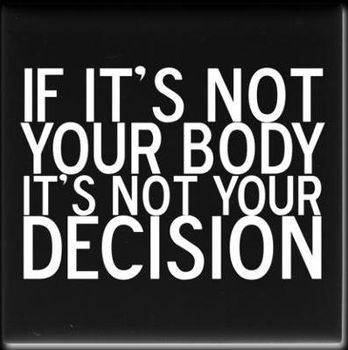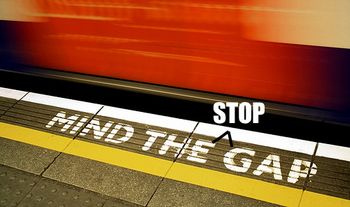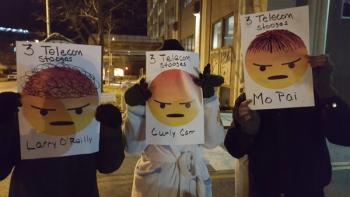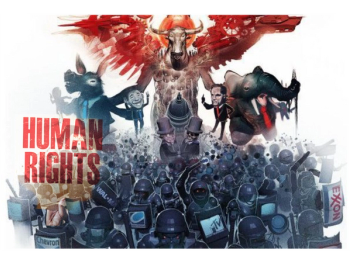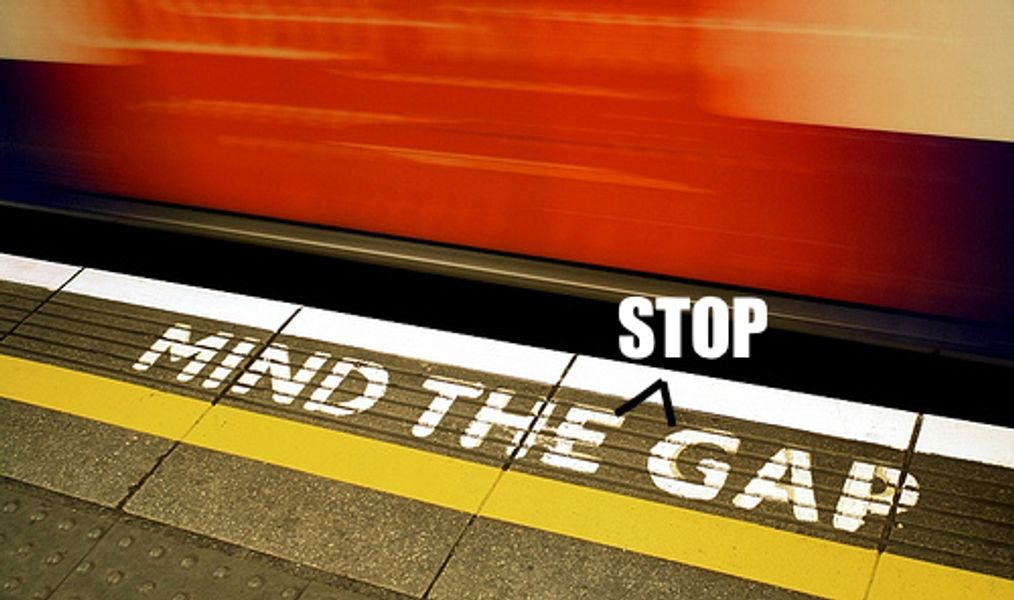
Mind the Stop-Gap
2018-05-27
by Eleanor Goldfield
The Left loves to argue. Infighting and petty tiffs abound – purity tests and religious-style righteousness hang like smog over so-called safe spaces, suffocating collaborations. One wonders sometimes whether or not the goal for many leftist individuals and organizations is not to fight for progress but rather to fight about it. And this is not to say that there isn’t vital work that is being done. There are so many powerful initiatives to both fight and build; ones that side step the privileged place of theoretical mind space and get shit done. The problem is that because many people lack a feeling of urgency. Add to this the simple truth that doing the work is a lot harder than talking about it and you find that people often just talk – and read. In the foreword to scott crow’s latest book, Setting Sights: Histories and Reflections on Community Armed Self-Defense, Ward Churchill critiques the leftist “retreat into theory” which suggests that “the only truly revolutionary activity is to be found in the reading of lots and lots of books and scribbling indecipherable tracts about the experience.” If knowledge is power, how come the intellectuals don’t hold office? How come our President doesn’t know his ass from his elbow and surrounds himself with people that literally think women were made from a man’s rib, the KKK isn’t racist and climate change is a hoax? Knowledge isn’t power – it’s potential. Of course we should still read, still seek and speak the truth; still learn from history and political theory, analyze and debate. The rise of anti-intellectualism in this country is horrifying and only fuels apathy, ignorance and thereby oppression. However, a potential unused will never become kinetic. If we don’t use that mental potential to precipitate actions that move us towards significant change, that knowledge is about as powerful as prayers for peace.
The question, and of course argument, then becomes of course – what actions? There is so much that needs unfucking. How do you decide what to work on, what to give your time and energy to?

Capitalism is a crisis and the cancer is late stage. The more time we spend arguing about the perfect path, the less time we spend walking the imperfect one. After all, no matter how perfectly you plan, nothing will ever go precisely the way you want or expect it. You’re gonna trip, you’re gonna fall, you’re gonna learn hard lessons that demand humility and swallowed pride. You’re gonna find yourself at the proverbial table with people you don’t personally like, that you don’t completely agree with, but you’ll endeavor to fight and build with them anyway. Because we have to. The silo landscape of that issue vs. this issue vs. that one over there conforms to the divide and conquer strategy of the system we all seek to change. Real solidarity doesn’t just mean showing up and doing the work – it also means not standing in the way of other progressive efforts. And that includes systemic stop-gap measures.
When it comes to large scale questions, i.e. the shift from capitalism to something less horrifically oppressive and destructive, the conversations have and could last decades. Some say that systemic stop-gap measures such as universal healthcare or universal basic income only feed into a reliance on a system that has absolutely no interest in our well-being. I absolutely agree with this critique. That being said, systemic stop-gap measures have and would save thousands of lives – not to mention uplift many thousands more.
Take UBI – or universal basic income as an example. The idea is that everyone in the nation would get a basic income from the government. The exact number varies but what it essentially amounts to is “wiggle room” money. It would be enough to get by so that if say, a parent wanted to take extra time with their kids, they could. Or if someone wanted to shift to part-time work due to health problems or so they could pursue their gardening or art or pole dancing – whatever the case may be – people would have that ability. They wouldn’t be so tightly tied to a 9-5, or indeed in many cases, several jobs. According to the Bureau of Labor Statistics, 7.8 million people held multiple jobs in 2017. And yet most Americans can’t afford an emergency bill – and 43% of Americans can’t afford basic needs like food and rent. Income inequality continues to rise as economists sound economic collapse alarms into an anechoic chamber. More and more jobs head in Wall-E’s direction while the gains of automation and AI only ever trickle up. In short, people need help. The chasm between rich and poor is growing wider and thousands if not millions are falling into the abyss. There are hundreds of other stats to dig up; no shortage of reasons why people need financial help – and why they deserve it. Regardless of where you are on the political spectrum, you can agree that workers work. So the idea that we get the least for the most work not only doesn’t make sense – it doesn’t sound sustainable. UBI would not only bolster the people but thereby the economy. It would shift the focus from surviving to thriving, but yes – it would also require that we adhere to the current capitalist system in some measure. It would require legislation meaning that we’d have to spend considerable time and energy lobbying politicians. The same goes for universal healthcare.

Just like the UBI argument, it doesn’t much matter where you are on the political spectrum. We can all agree that our “healthcare” system is a damn mess. According to the CDC’s 2016 Health Statistics, the number of persons in the U.S. who were uninsured at the time of the interview was 28.2 million. According to a 2009 study by the American Journal of Public Health, 45,000 Americans died that year due to lack of health insurance. Furthermore, research showed that uninsured, working-age Americans had a 40% higher death risk than those with private insurance. A 2017 Save The Children report shows that among 20 wealthy nations, the US ranks worst in child mortality rates. And even for those who manage to stay in the land of the living, holding on to life can quickly drain your bank accounts – even if you have health coverage. The American Journal of Medicine found that in 2007, 62% of all bankruptcies filed were tied to medical expenses. Three-quarters of those had health insurance. And while the ACA has helped some people, more than 28 million are still uninsured – as noted above. Furthermore, medical costs in the U.S. continue to outshine those of any other industrialized nation – both in terms of medical care and procedures, and pharmaceuticals. We spend more per person on healthcare than any other nation and yet people are getting neither access to healthcare nor fair pricing. Big pharma lobbied hard for their bottom line and won price controls meaning that Americans continue to be gouged for medicine that costs hundreds less just over the border in Canada. From the get-go, the ACA pedestaled profit over people behind the friendly facade Democrats have overused to the level of a sick cliché. The very concept of a mandate to buy health insurance speaks to the powerful influence of the insurance industry that’s made billions from the ACA. The only real way to put people before profit is to create a system where everyone is insured from birth to death, regardless of any pre-existing conditions – be they physical, economic or otherwise. A National Improved Medicare for All plan would also put the power in the people’s hands with regards to negotiating fair prices for medicine. It would cut billions from the administrative costs of our for-profit system that currently eats up $1 of every $3 healthcare dollars spent. Indeed, the bureaucratic bullshit is one of several reasons why even conservatives are coming to the single-payer table. Yet, some leftists still won’t pull up a chair. In their mind, any fight inside the system is a fight they’d rather stay outside of. And here’s the thing – that’s ok.
There are more than 300 million people living in the so-called United States. Not every single one needs to be on the front lines of the fight for UBI, or single-payer healthcare – or any other systemic stop-gap measure. If your fight takes you far outside the system – building alternatives that amputate the power of the state and focus rather on growing autonomy on a small scale, awesome. If your fight takes you into the halls of the mighty corrupt – lobbying for a measure that would save lives and buy time for a larger shift, that’s awesome too. There are brilliant and necessary efforts happening inside the system, outside and a little bit of both. Regardless, they are valid – and in some way, they are all stop-gap efforts. Nothing wins forever. Even when capitalism finally falls, there will be new problems – new issues to fight and build around. So, wherever your fight takes you – keep fighting and don’t block the way for others. No one’s path is the purest; no one path is the only way we can progress.
The purity test mentality is tied to the absolutist paradigm that suggests there can only be one path – one way of organizing, of fighting and of building. But that’s a fallacy. The fight for universal healthcare and the building of small autonomous clinics in Puerto Rico are not mutually exclusive. They’re different answers to the same problem – answers that may someday overlap, or not. Neither one is ultimate and neither one is perfect. Because again, even if you think you have the perfect path, it’ll never look perfect when manifested in reality. Shit happens – human folly and mistakes happen. Hell, our own hypocrisy happens. Indeed, our very push for anti-capitalist progress in a capitalist system demands a certain level of hypocrisy. I have a phone made from conflict materials. I pay taxes that go to war and destruction. Some of the plastic in the ocean is undoubtedly mine.
I will always try to mitigate my damaging footprint but I have to also keep walking. So really, we all fail the purity test. All of our paths are imperfect, jagged and utterly human. Instead of arguing over whether or not someone who eats meat can be an environmentalist, lock arms and block some fucking bulldozers. Instead of wasting time shitting on people who fight for what you consider to be stop-gap measures, show solidarity and continue on with your work – our work. Because really, the truth is that we need each other. And not in some kumba ya, ethereal way but in a really straight-forward, no-bullshit, this is a capitalist crisis and we have work to do kind of way.

Debate, analysis and critique should always be welcomed and considered. Infighting should be shut down like a pipeline construction site. We should question our work and invite others to do the same – be it specific tactics or over-arching questions as to who will benefit from our work. We should be clear on what we’re fighting for so that we’re not just fighting for lip service or facade solutions. And if you feel that systemic stop-gap measures are facade solutions, let’s have that conversation. But let’s have that off to the side – and not in the path of progress.
(To continue the fight against censorship and suppression of anti-establishment news outlets, become a patron of our work via the Patreon button at the bottom of this page and join the free newsletter.)



